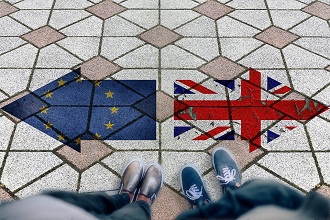Europe’s Highest Court to Issue Decision ‘Quickly’ on Whether Brexit Can be Reversed
Europe’s Highest Court to Issue Decision ‘Quickly’ on Whether Brexit Can be Reversed

The European Court of Justice is to decide whether Article 50, the mechanism by which the UK withdrew from the EU, can be unilaterally reversed by Britain without the permission of other EU member states. The ECJ said it will decide “quickly” on the case following the hearing on November 27th.
The case has been brought by a cross-party group of Scottish politicians who oppose Brexit and are seeking to secure Britain’s legal right to withdraw their notice to leave the EU before March 2019.
The government however maintains that it has no intention of reversing the withdrawal decision or to hold a second referendum on the final Brexit deal. The government applied for the Supreme Court to hear the case in a last-ditch effort to avoid the legality of the issue being decided in the ECJ, but judges in the UK’s top court refused the application. The Supreme Court is the highest court in England and Wales, whilst the ECJ is the authority on EU law, whose decisions on the application of EU law bind all courts across the European Union.
Scottish court to make final judgement
Judges in the Court of Session in Edinburgh first ruled to refer the question of whether a member state can unilaterally reverse its own Article 50 decision to the ECJ in September. The Court of Session is the supreme civil court of Scotland.
Under Article 267 of the Treaty on the Functioning of the European Union, national courts can apply to the ECJ to make preliminary rulings on the validity and interpretation of EU law.
The ruling simply serves as a clarification on a point of EU law as requested by judges in a national court however, and it remains for the domestic judges to decide how this clarified EU law then applies to the facts of the case at hand.
With the British government’s Supreme Court appeal dismissed, the EU will now provide a preliminary ruling to the Court of Session, with the Court of Session then left to apply the law to the case.
The Supreme Court underlined this in its dismissal, stating: “It will therefore remain for the Court of Session to give judgement in the light of the preliminary ruling, any relevant facts…and any relevant rules of domestic law. It is only then that there will be a final judgement.”
Government “disappointed” by decision
Responding to the Supreme Court’s dismissal, a spokesperson for the government stated: “We are disappointed by the decision of the court and it remains a matter of firm policy that we will not be revoking Article 50.”
Commentators nonetheless speculate that the outcome of the case could have an impact on the final Brexit deal, either paving the way for a second referendum or removing any question of reversing the decision.
If the ECJ rules that a member state has the right to withdraw an Article 50 notice to leave the EU without any permission from other member states, it would validate calls for a second referendum, presenting a challenge for the government’s draft divorce bill.
Business leaders including Mike Flewitt – head of British car manufacturer McLaren – have emphasised the importance of the “urgently needed certainty” which the government’s current proposal Brexit deal brings to the economy.
Politicians however have voiced dissatisfaction with the draft deal, with many backing calls for a second referendum and cabinet ministers including Brexit secretary Dominic Raab resigning over the deal.
Prime Minister Theresa May has remained steadfast in commitment to her proposal and says that Britain faces three options: accepting the current deal, leaving the EU with no deal in place, or reversing the decision to leave the EU.
Contact our legal experts today
For advice on steering your organisation through Brexit, strategic planning and fulfilling your business objectives, please contact our experienced solicitors today on 03456 381381 or email enquiries@ibblaw.co.uk.
You may also be interested in
